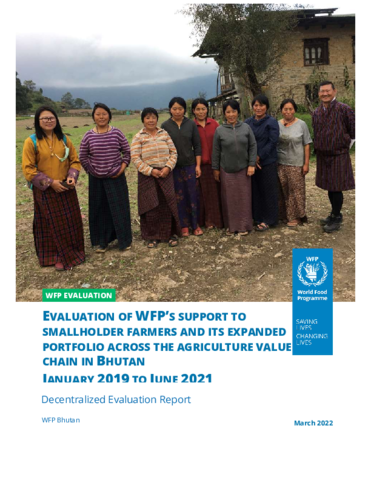
The evaluation was commissioned to i) draw lessons from limited WFP agriculture sector assistance under the current Country Strategic Plan (2019-2023); (ii) establish the extent to which WFP helped build farmer-school supply chain linkages and responded to COVID-19; (iii) build understanding of WFP and Government contributions to gender, climate, and nutrition; (iv) review digital innovation promoted by WFP; and (v) identify scaling-up opportunities by developing a WFP value proposition. It was intended for both accountability and learning purposes. It focused on assessing the relevance, coherence, effectiveness, efficiency and sustainability of the WFP’s support to smallholder farmers and expanded portfolio across the agriculture value chain in Bhutan . Overarching evaluation questions included:
- How relevant was the agriculture portfolio?
- What results were achieved?
- How flexibly did WFP respond to changes in the development context?
- How well did WFP integrate its portfolio with those of its partners? and,
- What is the potential for the results to be sustainable?
Key evaluation findings included:
- WFP operations demonstrated relevance to national agriculture, education, nutrition and health policies, including the Rural Natural Resources Strategy 2040 (2020) and Marketing Policy (2017; 2021), while the Country Office had yet to establish a sector reputation with government and potential UN partners in the agriculture sector.
- Despite resource and COVID-19 access constraints, WFP interventions supported the School and Hospital Feeding Programme to establish farmer-school linkages and the emergence of a national fresh produce market providing incomes to 7,516 smallholders, two-thirds of them women.
- WFP responded flexibly to government requests for agriculture policy and programme contributions and support to the Economic Contingency Plan, but limited resources and the absence of a clear intervention logic meant WFP resources were used by government to support its production ambitions rather than the wider food and market systems needs of smallholders.
- To address inefficient resource mobilisation efforts, a weak funding position, and support the expansion of the country office, a more structured fundraising approach was introduced in 2021 based on a funding cycle with associated tools and clearer roles and responsibilities that showed early signs of success.
- With WFP support still in its infancy, the Bhutan country office nevertheless began to build linkages to nutrition and disaster risk management through investments in digital innovation and de-risking agriculture but left gaps in its support for market systems development and business incubation.
Key recommendations from the evaluation included:
- Expand its role and positioning for agriculture in Bhutan, WFP should support tangible development outcomes, enhanced resource contributions and expanded support for country capacity strengthening.
- Advance WFP’s value proposition for agriculture in Bhutan through a primary focus on supporting smallholder access to agriculture markets as a basis for the development of effective government, partner and donor relations that draw on the Country Office’s areas of recognised leadership.
- Develop a partnership strategy providing a clear focus and direction for the Country Office’s engagements with government, UN and Civil Society counterparts beyond its project activities and that links directly to the future delivery of planned outcome areas in line with the value proposition, such as the Department of Agriculture Marketing and Cooperatives and Civil Society groups’ support to rural women’s economic empowerment and youth entrepreneurship.
- Establish key organisational capacities to deliver a balanced portfolio of innovation projects, country capacity strengthening and resource mobilisation support for government.
- Build on high levels of existing engagement of rural women the agricultural portfolio and commit to the transformative opportunities of organisational capacity strengthening for rural women, farmers’ groups and cooperatives.
